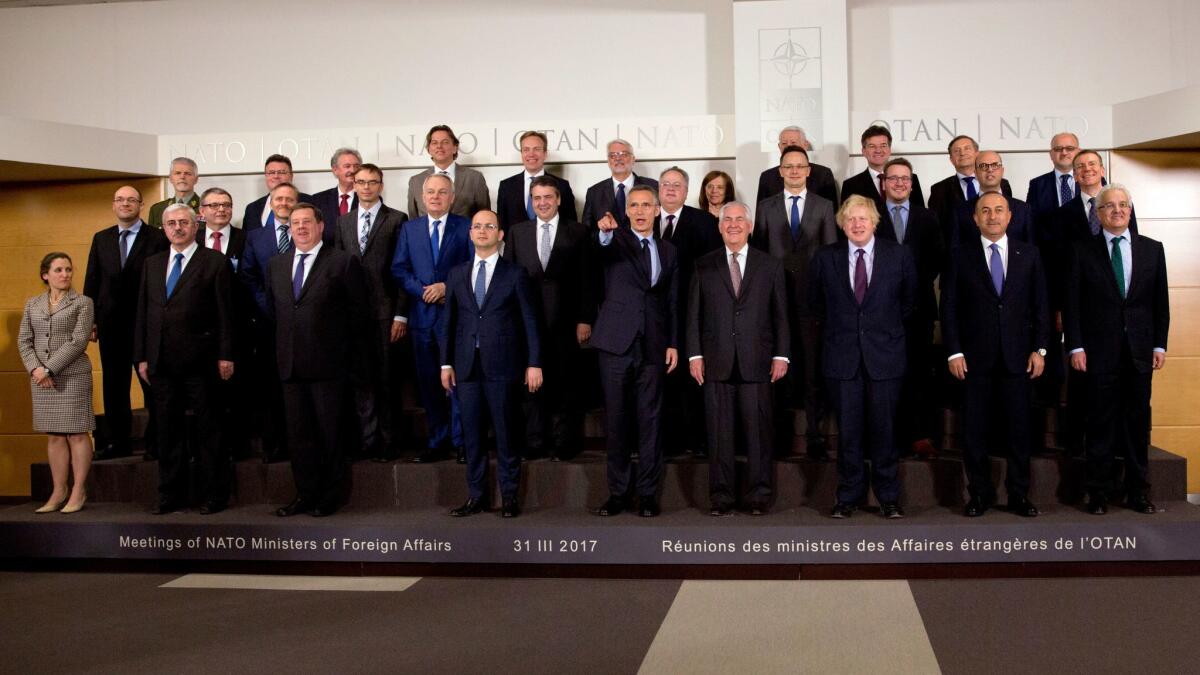Op-Ed: If Trump really wants to improve relations with Russia, he should persuade NATO to stop expanding

President Trumpās relationship with Russian President Vladimir Putin may turn out to be too close for comfort, but Trumpās instincts about U.S.-Russia ties are at least partly right. The U.S. simply canāt afford poor relations with the planetās other nuclear superpower.
Security in Syria depends on it, for one. The even bigger issue, however, is security in Europe, where tensions between Russia and NATO have been acute for three years.
Some analysts maintain that Putin cultivates an adversarial relationship with the outside world to strengthen his popularity at home and thus his hold on power, and also to provide him with an excuse to suppress dissent. This may be true, but he also appears to bear a genuine grudge against the United States for its post-Cold War assertiveness near Russian territory. For two decades, and especially over the last 10 years, Putin and many other Russian officials have complained that NATOās eastward march threatens Russiaās security.
Granted, NATO has gone out of its way to consult and work with Russia since the Cold War ended. It has also avoided putting major combat forces in new member states that are located near Russiaās borders.
One can understand why Russians would find it overbearing and triumphalist that NATO moved 1,000 miles east while taking in a dozen new members.
Still, one can understand why Russians would find it overbearing and triumphalist that NATO moved 1,000 miles east while taking in a dozen new members, most of which were previously part of the Warsaw Pact or the Soviet Union. The U.S. also supported democratic forces that gave rise to revolutions in Ukraine, Georgia and Kyrgyzstan, and, as Moscow sees it, we attacked other countries, including Serbia, Iraq and Libya, without a legal basis for doing so and often with poor results. Meanwhile, NATO expansion continues. Last month, the U.S. Senate ratified the Balkan nation of Montenegroās accession to the alliance, and Trump on Tuesday signed off on the move.
In Putinās eyes, we are an out-of-control hyper-power that must be opposed. His view is warped, but it appears to be sincere.
The whole situation is counterproductive, and nowhere more so than in Ukraine and Georgia. President George W. Bush persuaded NATO to publicly offer eventual membership to the two countries ā both former Soviet republics, both adjacent to Russia ā but there was no timetable established and no interim guarantee of security in the meantime. They are thus fully exposed to Russian aggression. Exacerbating matters, NATO has a longstanding policy of not accepting new members until they resolve any territorial disputes with neighbors. Though a sensible idea in the abstract, the policy gives Putin an incentive to stoke trouble with Ukraine and Georgia, because any ongoing disputes invalidate their near-term eligibility for NATO membership.
Trump should at least try to deescalate tensions. He could do so with a broad agreement between NATO states, Moscow and the neutral countries of Europe. In such an agreement, NATO could vow not to expand further. In return, Russia would commit to leave the neutral countries alone, withdraw military forces from their territories, allow them to join whatever diplomatic and economic groups they want (including the European Union), and stop arming and abetting separatists in places such as the Donbas region of Ukraine and northern Georgia. Once Putin met these conditions, the U.S. could lift its sanctions against Russia.
Trumpās two predecessors also wanted to improve U.S.-Russia relations, of course. Bush tried until disputes over Iraq and NATO soured the atmosphere; Russia then invaded Georgia in the summer of 2008. President Obama talked of a āresetā with Moscow before his hopes were dashed by Russiaās aggression against Ukraine and Syria, and by Putinās suppression of dissent and democracy at home.
Putin continues to make diplomacy difficult. He is now adamantly opposing Trumpās limited and careful reprisal against the gruesome use of chemical weapons by the Syrian regime. And as investigations heat up into Russian interference in the U.S. presidential election, much of Trumpās top national security team is reverting to anti-Russia rhetoric.
If we continue down this path, a U.S.-Russia war could even erupt over a contested area in Europe. To reduce the risk, we need to develop an alternative to further expansion of NATO, one that promotes the security and prosperity of the neutral countries in Eastern Europe.
Michael E. OāHanlon is a senior fellow in foreign policy at the Brookings Institution.
Follow the Opinion section on Twitter @latimesopinion or Facebook
More to Read
A cure for the common opinion
Get thought-provoking perspectives with our weekly newsletter.
You may occasionally receive promotional content from the Los Angeles Times.










